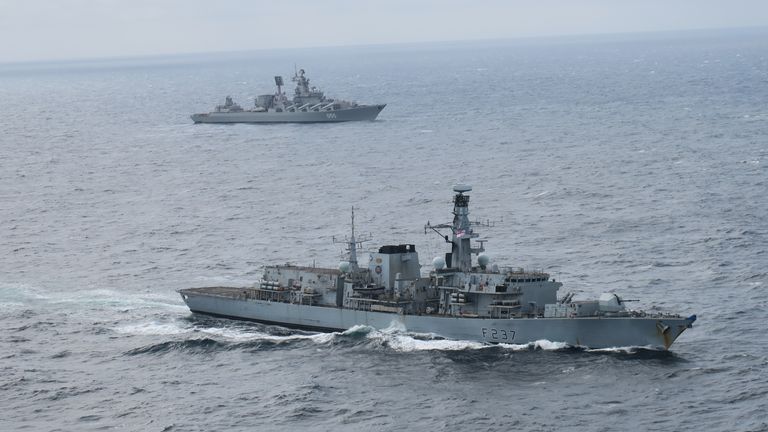Royal Navy shadows Russian warships as they pass near UK waters
Three Royal Navy warships shadowed a Russian Navy task force as it passed through waters close to the UK.

Three Royal Navy warships shadowed a Russian Navy task force as it passed through waters close to the UK.
HMS Westminster, HMS Lancaster and HMS Richmond, all Type 23 frigates, tracked the Slava-class cruiser Marshal Ustinov as the Russian group headed home from the eastern Mediterranean after supporting President Vladimir Putin’s invasion of Ukraine.
Marshal Ustinov was accompanied by Udaloy-class destroyer Vice-Admiral Kulakov and tanker Vyazma.
The cruiser is the sister ship of the doomed Russian warship Moskva, which Ukraine says it sunk in a missile attack and Russia claims sank during a storm after a fire detonated ammunition on board.
Russia uses Phillip Schofield on This Morning ‘as propaganda’ – follow latest updates
Patrol ship HMS Mersey also shadowed Russian military research vessel Akademik Ioffe on its journey south through the Dover shipping lanes and into the Channel.
HMS Westminster’s commanding officer (CO), Commander Ed Moss-Ward, said: “Maritime security in the sea areas around the UK is crucial to our prosperity and resilience.
“The Royal Navy routinely responds to escort warships in UK territorial waters and the adjacent sea areas to ensure compliance with maritime law, to deter malign activity and to protect our national interests.
“Escorting the Russian task group has demonstrated that the Royal Navy is committed to maintaining maritime security and to co-operating with our NATO allies.”
The Royal Navy operation
HMS Lancaster, part of NATO’s fast response task force in the Atlantic, shadowed the Russian ships from the Strait of Gibraltar to the Celtic Sea.
HMS Westminster deployed from Portsmouth to intercept the Russian ships in the Celtic Sea, where Marshal Ustinov was refuelled by the tanker Vyazma.
HMS Richmond kept watch in the English Channel.
CO of HMS Lancaster, Commander Tom Johnson, said: “Working together allows NATO allies to respond to security challenges at pace and collectively deter potential aggressors.
“Exchange of personnel further deepens NATO cohesion and interoperability so that the alliance can swiftly and efficiently react to any threat.
“Lancaster’s team work exceptionally hard to ensure we are always ready to respond to any threat at a moment’s notice.”


